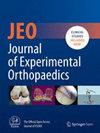Effects of total knee arthroplasty on symptoms, function and activity over 5 years in knee osteoarthritis: A propensity-score matched study
Abstract
Purpose
To evaluate the effects of total knee arthroplasty (TKA) on symptoms, function and activity over 5 years in knee osteoarthritis (KOA) patients.
Methods
Data were from the Osteoarthritis Initiative (OAI). Participants who conducted the first TKA from (not before) enrolment to 48 months were propensity score matching (PSM) on their characteristics at the visit before surgery (treated as baseline) to those who did not conduct a TKA at 48 months (treated as baseline). Changes in knee pain and functional disability were evaluated using the Western Ontario and McMaster Universities Osteoarthritis Index (WOMAC) pain and function subscales. Changes in physical activity, physical function and overall physical health and mental health were assessed using the Physical Activity Scale for the Elderly, the 20-m walk speed and the five times chair-to-stand tests and the 12-Item Short Form Survey, respectively.
Results
Eighty-two pairs of participants in the TKA (56% women, mean 64.8 ± 8.4 years) and non-TKA groups were matched. Knee symptoms were significantly improved in the TKA group and flatted from 24 months (Pain: β = −3.29, 95% confidence interval [CI] = [−4.59 to −1.99], p < 0.001; Function: β = −10.12, 95% CI = [−14.21 to −6.03], p < 0.001). Physical function and overall physical health but not physical activity or mental health (PASE: β = 5.72, 95% CI = [−15.46 to 26.90], p = 0.597; Mental: β = 0.04, 95% CI = [−2.47 to 2.54], p = 0.976) was improved in the TKA group over 24 months.
Conclusions
TKA substantially improved knee symptoms and physical function over 60 months and physical health over 48 months, compared to those who had a similar severity of KOA but did not have a TKA, but this did not translate into increased physical activity or mental health.
Level of Evidence
Level III.

 求助内容:
求助内容: 应助结果提醒方式:
应助结果提醒方式:


